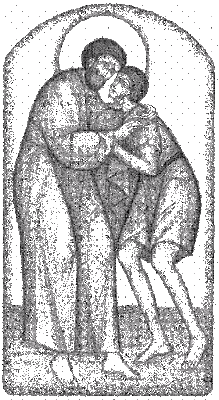XXIV SUNDAY IN ORDINARY TIME - Lk 15:1-32
In the second reading, in his first letter to Timothy, Paul quotes a saying which he considers to be true about Jesus’ mission: “Christ Jesus came into the world to save sinners” (1 Tim 1:15), and he sets himself forward as an example, considering himself “the greatest” sinner, who was forgiven, loved and called to be an apostle.
In this Sunday’s gospel we are presented with three parables on God’s loving mercy: looking for the lost sheep; finding the lost coin and finally the story of the man who had two sons, mostly known as the parable of the prodigal son. The two sons of the parable represent each one of us. We may be the youngest son who feels oppressed in his father’s house and decides to leave in search of his way. Cutting all the links with the past and loosening all the ties with his father, he goes far away, putting all that behind and moving into unknown territory where he dreams of finding pleasure, joy and happiness. Far away from his father, he could breathe freely and do whatever pleased him. However, that freedom and that joy lasted but a while and much sooner than he could have imagined he started experiencing hardship and loneliness that led him to the point of despair. He was confronted with his shortcomings, weaknesses, failures and sins. Experiencing the hardness of life, he was able to remember his father’s caring love. The young son represents all those who turn to God when they pass through difficult times and realise the emptiness left by the pleasures of the world.
Reading the parable, we may concentrate on the youngest son and ignore the attitude of the eldest one. He was a well behaved and responsible son who took life seriously. We may say that he deserved a prize and that he would be the pride of any parent. So, when he appears, we are puzzled by his behaviour towards his father and his younger brother. And we are left in doubt, since the parable comes to an end, keeping us in suspense: did he go in and took part in the feast or did he leave, turning his back on his father? Both outcomes are possible.
If we look attentively to Paul and pay attention to what he wrote to Timothy, we may discover in him the eldest son. Being a Pharisee, Paul excelled in keeping the Law and abhorred the Christian Way as dangerous. Thus he became a persecutor of the Church, harassing the followers of Jesus and throwing them into prison. Wholeheartedly dedicated to preserving the purity of the Law, he could not see the mercifulness of God and could not accept that God may call people of any tribe and race into his fellowship. His goodness became pride and his pride blinded him. With his persecution of Christians, Paul allowed his heart to be filled with pride and hatred, which would end destroying whatever good there was in him. However, his life took a turn to the right, when he was faced with Jesus’ question: “Why are you persecuting me?” This conceited man had to be pushed over to realise how much he had gone astray and how lost he was. This awareness of his sin made it possible to accept God's merciful love that would lead him to say: “Christ Jesus came into the world to save sinners. I myself am the greatest of them; and if mercy has been shown to me, it is because Jesus Christ meant to make me the greatest evidence of his inexhaustible patience for all the other people who would later have to trust in him to come to eternal life.” (1 Tim 1:15-16).

No comments:
Post a Comment